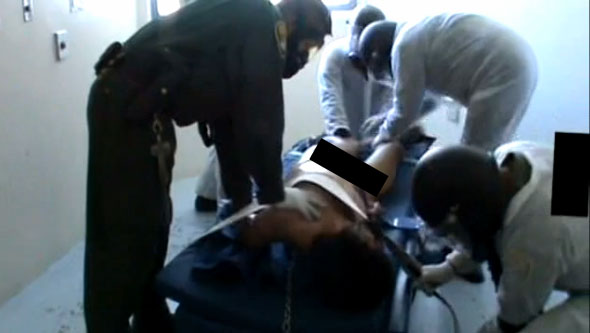‘Bombshell’ Report
State attorneys had provided data showing that they were meeting requirements for care with the current staff levels and sought to reduce the staff further through the use of telepsychiatry, in which inmates interact with a psychiatrist via computer. But one day before the judge was scheduled to consider the plan, Golding turned in his report, calling that data into question.
“It was really a bombshell,” said Bien. “There’s no choice but to completely re-evaluate all of our relations with defendants and their lawyers.”
Bien said he learned about Golding’s 160-page report in early October, when the psychiatrist sent a copy to the court-appointed receiver in charge of prison medical care.
Golding raised serious doubts about the ability of the state to care for roughly 30,000 inmates in California diagnosed with mental illness, Bien said.
“In his view the mental health care system was operating way below any standard, and in fact in a dangerous way for patient safety,” Bien said. “And defendants were representing exactly the opposite.”
Fraud on the Court?
Golding alleged that state officials distorted data on how often those inmates see psychiatrists and how well those doctors monitor medications they’ve prescribed to them, according to Bien.
Attorneys for the state have argued that Golding’s report should be sealed pending investigation to protect the identity of employees. The state submitted suggested redactions to the report on Tuesday, should the court decide to unseal it.
California Department of Corrections and Rehabilitation spokesman Jeffrey Callison declined to comment on the matter.
“Typically we do not issue comment on matters that are the subject of litigation,” Callison wrote in an email.
Staffing Shortages, Delays
The case, now called Coleman v. Brown, was filed in 1990 and sought to improve care for prisoners who suffer from mental illness.
The state has increased spending and rolled out numerous reforms since then but still struggles to fill staffing vacancies.
Today, 25 percent of psychiatric staffing positions approved under a 2009 plan remain vacant, Bien said.
Delays in psychiatric treatment factored heavily into a 2011 U.S. Supreme Court decision upholding a federal court order to reduce California’s prison population and ensure inmates received minimal and timely medical and mental health care.
Gov. Jerry Brown declared in 2013 that California prisons had resolved all deficiencies in psychiatric care for inmates, and the state filed a motion to dismiss the Coleman lawsuit.
Later that year, Judge Lawrence Karlton, who is now deceased, ruled that the state had not met constitutional minimums for psychiatric care, as evidenced by increased suicides among prisoners and the state’s failure to implement court-mandated improvements to suicide prevention.
In 2014, attorneys for inmates challenged the routine use of force on mentally ill inmates, including the use of pepper spray on prisoners in their cells.
A series of videotapes depicting some of the most egregious practices drew outrage from the court and led to new rules restricting the use of pepper spray and solitary confinement for inmates with mental illness.
